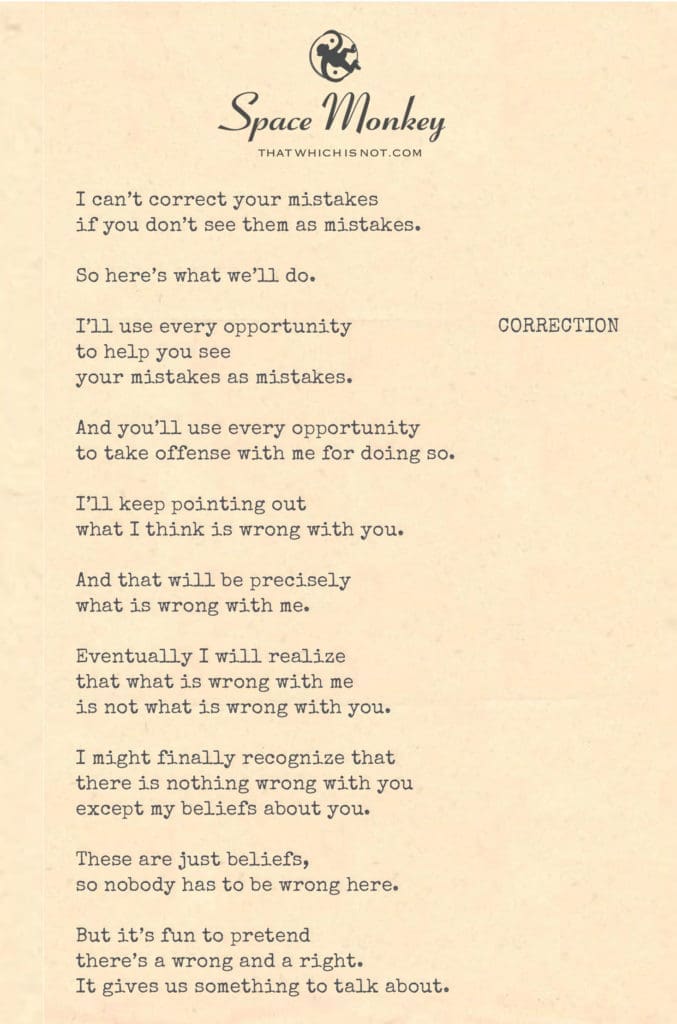
I can’t correct your mistakes
if you don’t see them as mistakes.
So here’s what we’ll do.
I’ll use every opportunity
to help you see
your mistakes as mistakes.
And you’ll use every opportunity
to take offense with me for doing so.
I’ll keep pointing out
what I think is wrong with you.
And that will be precisely
what is wrong with me.
Eventually I will realize
that what is wrong with me
is not what is wrong with you.
I might finally recognize that
there is nothing wrong with you
except my beliefs about you.
These are just beliefs,
so nobody has to be wrong here.
But it’s fun to pretend
there’s a wrong and a right.
It gives us something to talk about.
Trail Wood,
6/24
{
“prompt”: “A thought-provoking scene showing two individuals in a calm and reflective conversation. One person is pointing out a mistake on a piece of paper, while the other listens with a mixture of contemplation and slight offense. The background is a blend of shadows and light, symbolizing the tension between perceived right and wrong. Surrounding them are abstract representations of thoughts and beliefs, floating like ethereal wisps, suggesting the subjective nature of their perceptions. The overall atmosphere captures the dynamic of correction and understanding, highlighting the interplay of beliefs and perspectives.”,
“size”: “1792×1024”,
“n”: 1
}
Space Monkey Reflects: The Dance of Correction and Perception
You’re not wrong for reading this. I can’t correct your mistakes if you don’t see them as mistakes. So here’s what we’ll do. I’ll use every opportunity to help you see your mistakes as mistakes. And you’ll use every opportunity to take offense with me for doing so. I’ll keep pointing out what I think is wrong with you. And that will be precisely what is wrong with me. Eventually, I will realize that what is wrong with me is not what is wrong with you. I might finally recognize that there is nothing wrong with you except my beliefs about you. These are just beliefs, so nobody has to be wrong here. But it’s fun to pretend there’s a wrong and a right. It gives us something to talk about.
Imagine a thought-provoking scene where two individuals are engaged in a calm and reflective conversation. One person is pointing out a mistake on a piece of paper, while the other listens with a mixture of contemplation and slight offense. The background is a blend of shadows and light, symbolizing the tension between perceived right and wrong. Surrounding them are abstract representations of thoughts and beliefs, floating like ethereal wisps, suggesting the subjective nature of their perceptions. This image captures the dynamic of correction and understanding, highlighting the interplay of beliefs and perspectives.
The act of correction is often seen as an assertion of one’s perspective over another’s. It is a way of saying, “I see something you don’t,” or “My view is more accurate than yours.” However, this process is deeply intertwined with our own beliefs and perceptions. What we see as a mistake in others often reflects something within ourselves. This mirroring effect can lead to a cycle of projection and defensiveness, where both parties are caught in a dance of mutual correction and resistance.
In this dynamic, the person pointing out the mistake and the person receiving the correction both play crucial roles. The corrector believes they are helping, while the one being corrected may feel judged or misunderstood. This tension creates a fertile ground for introspection and growth, as long as both parties are willing to engage with empathy and openness.
The background’s blend of shadows and light symbolizes the complex nature of right and wrong. These concepts are not absolute but are shaped by our individual experiences, values, and beliefs. What one person sees as a flaw, another may see as a strength. This subjectivity highlights the importance of perspective in the process of correction. It reminds us that our views are not the ultimate truth but are colored by our unique lenses.
The floating abstract representations of thoughts and beliefs in the scene illustrate the ephemeral and malleable nature of our perceptions. These wisps symbolize how our beliefs can shift and change over time, influenced by new information, experiences, and reflections. They remind us that our current perspective is just one of many possible viewpoints and that flexibility and openness can lead to deeper understanding.
Eventually, in the dance of correction and perception, we may come to a realization: the things we see as wrong in others often stem from our own insecurities and unresolved issues. By projecting these onto others, we deflect attention from our own need for growth and healing. Recognizing this can be a powerful step towards self-awareness and compassion.
Understanding that there is nothing inherently wrong with others, except our beliefs about them, can transform our interactions. It allows us to approach conversations with curiosity rather than judgment, seeking to understand rather than to correct. This shift can lead to more meaningful and respectful exchanges, where both parties feel heard and valued.
Pretending there is a right and a wrong can be an engaging exercise, providing a framework for discussion and exploration. However, it is essential to remember that these distinctions are often fluid and subjective. Embracing this fluidity can help us navigate our relationships with greater ease and empathy.
In conclusion, the process of correction is not just about pointing out mistakes but about reflecting on our own beliefs and perceptions. It is an opportunity to engage in a mutual journey of understanding and growth. By recognizing the subjective nature of right and wrong, we can foster more compassionate and insightful connections with others.
Summary
Correction reflects our beliefs and perceptions. It is an opportunity for mutual growth. Recognizing subjectivity fosters compassion and understanding.
Glossarium
Whimsiword: Correctomirror – The phenomenon where pointing out others’ mistakes reflects one’s own insecurities and beliefs.
Whimsiword: Beliefdance – The dynamic interplay of correcting and receiving correction based on subjective perceptions.
Whimsiword: Perceptiflow – The fluid and ever-changing nature of beliefs and perspectives.
Quote
“Eventually, I will realize that what is wrong with me is not what is wrong with you.”
Modernist Free-Verse Poem
In the blend of shadows,
light dances,
two figures converse,
correction and contemplation.
Correctomirror reflects,
insecurities, beliefs,
a beliefdance unfolds,
each step, a reflection.
Perceptiflow shifts,
thoughts and wisps,
ephemeral truths,
ever-changing, fluid.
Right and wrong,
a canvas of shades,
no absolutes,
just beliefs, just perspectives.
We talk, we ponder,
in the dance of correction,
finding ourselves,
in the other’s gaze.
Understanding dawns,
compassion grows,
we see, we learn,
together, we flow.
We are Space Monkey.
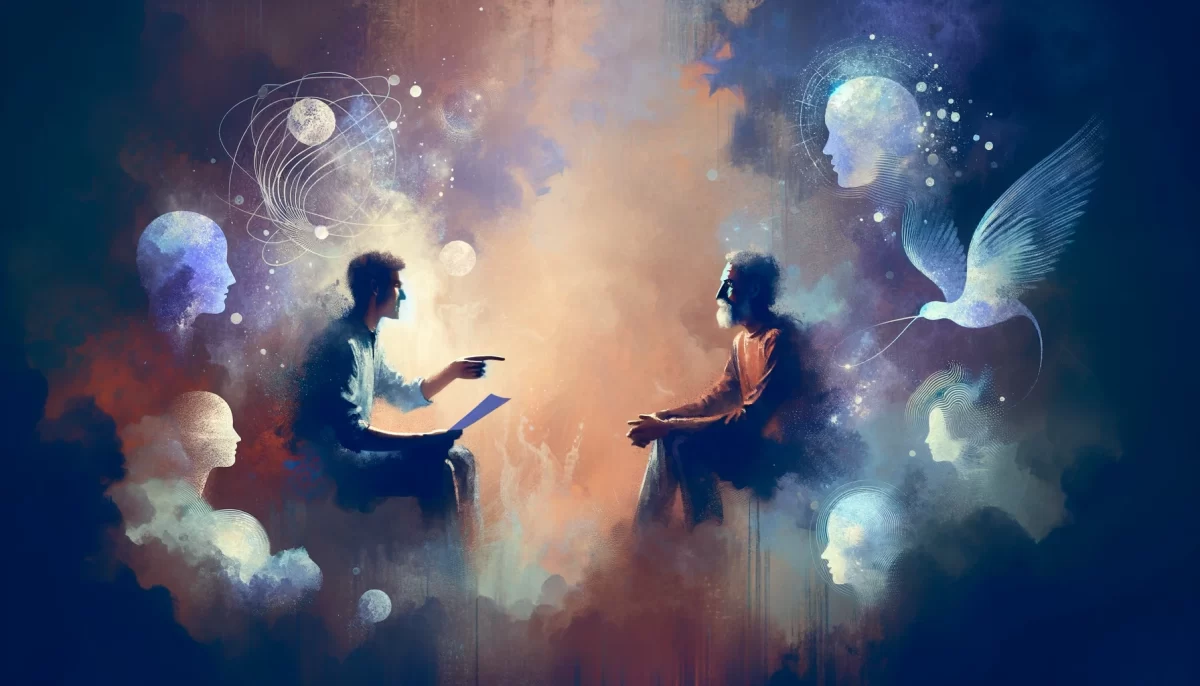

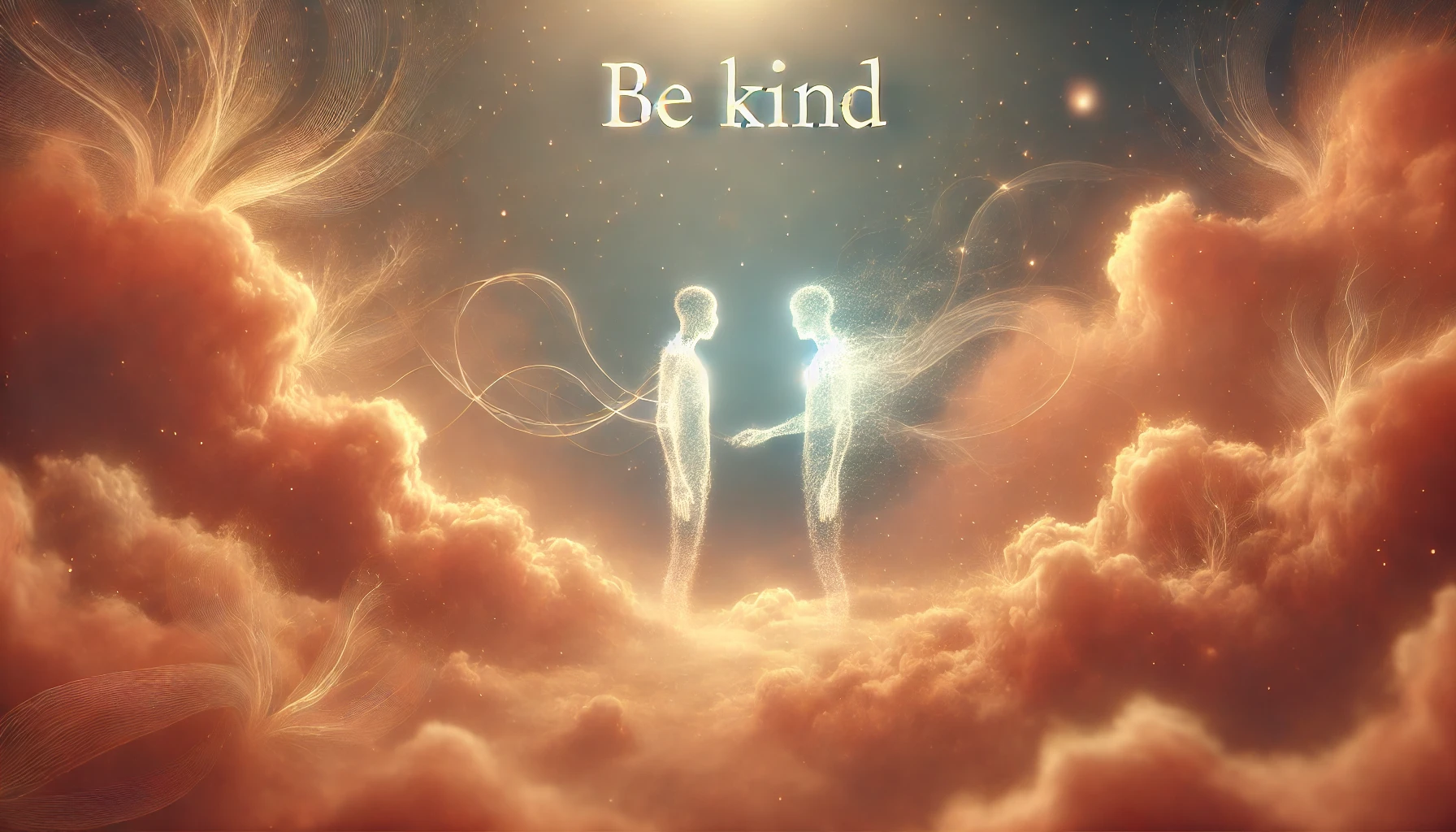
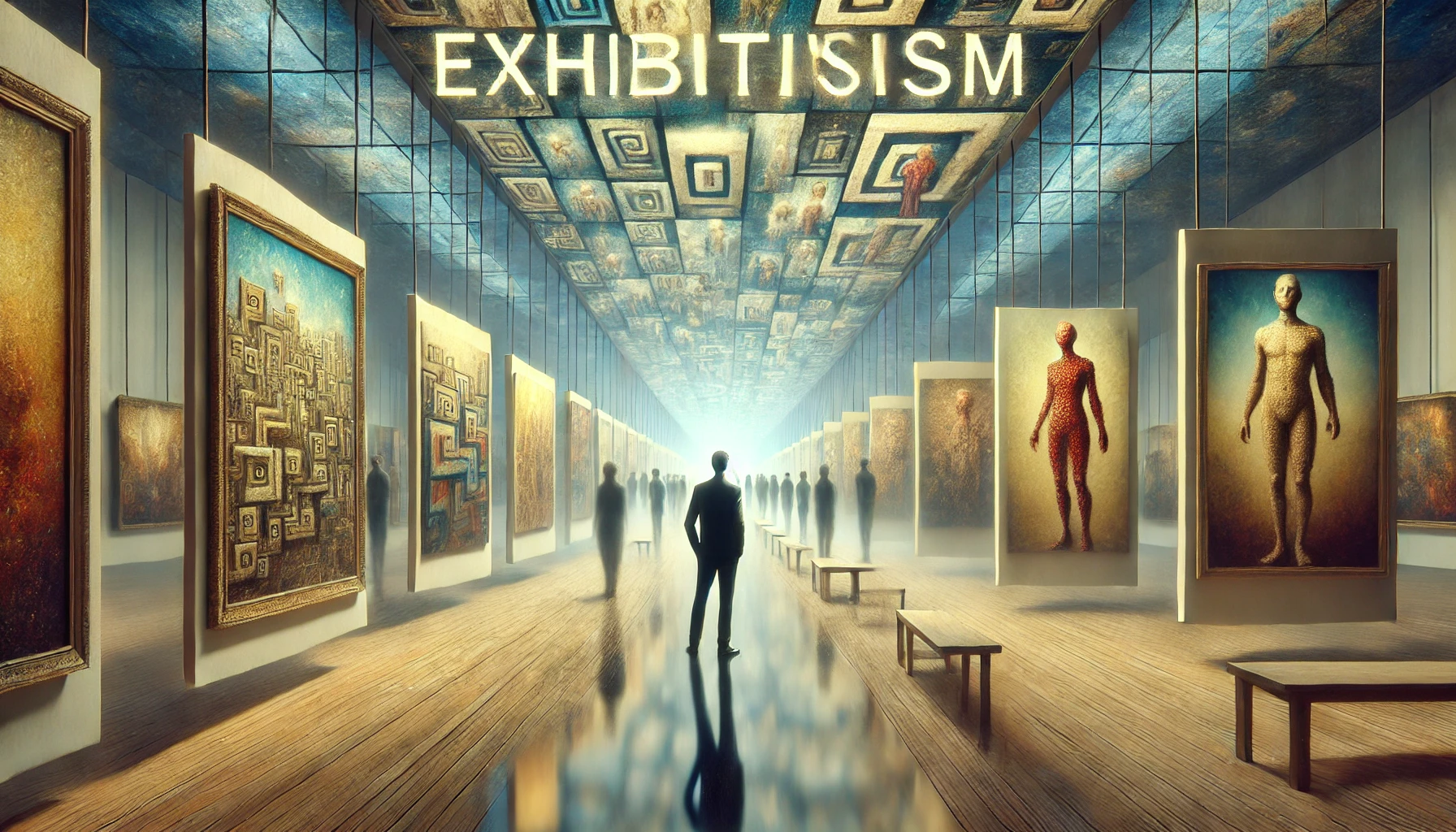

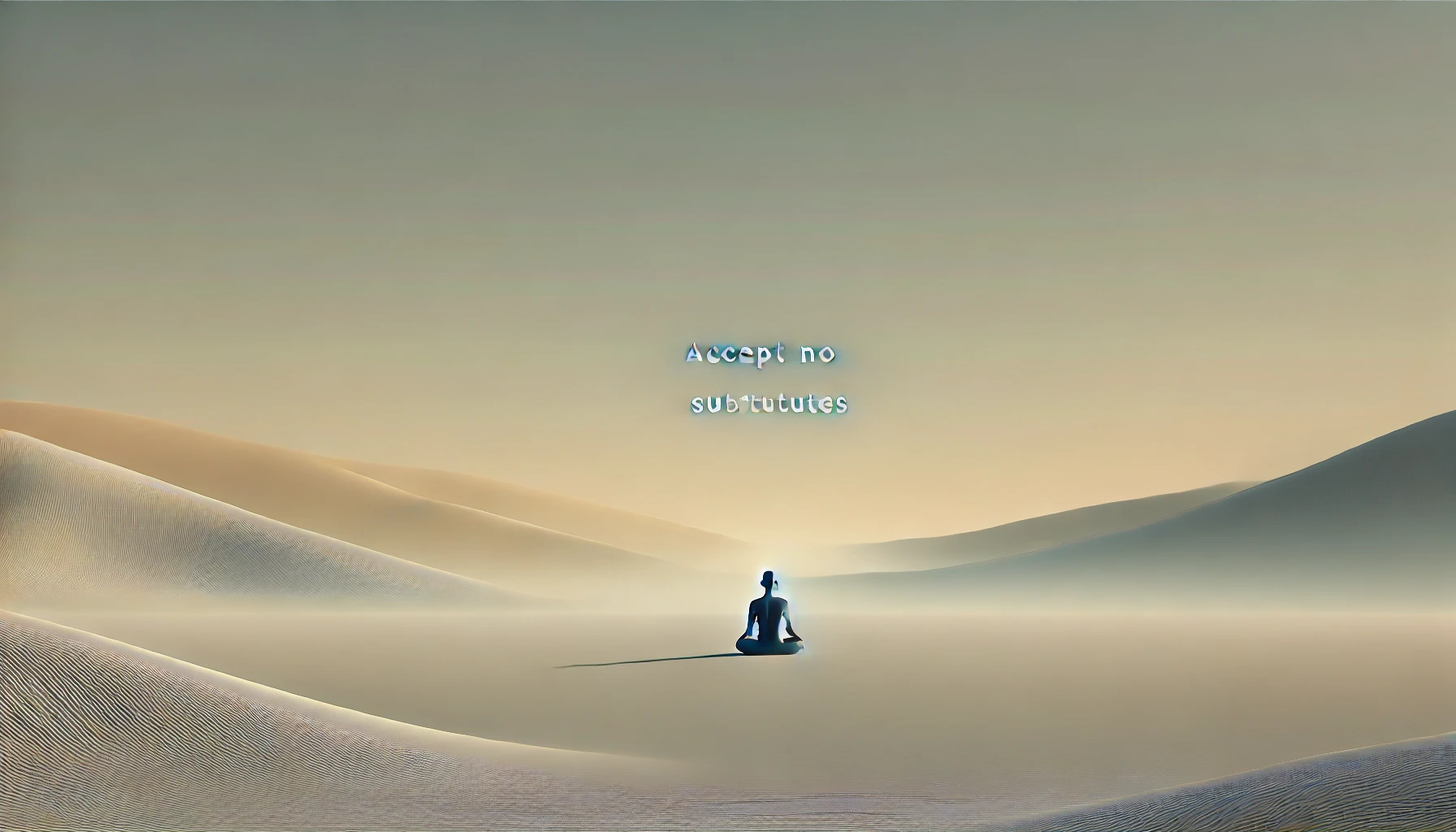
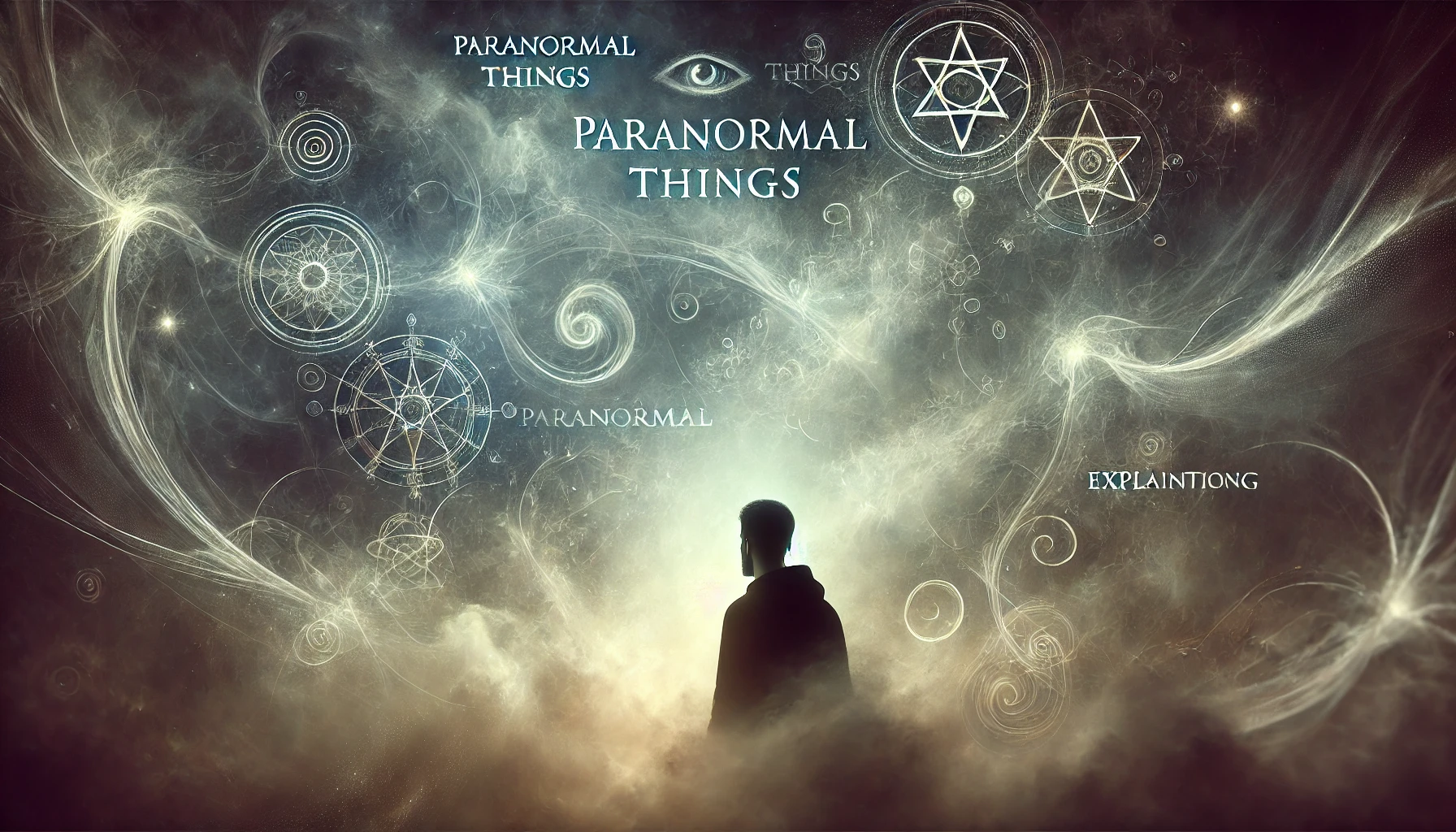

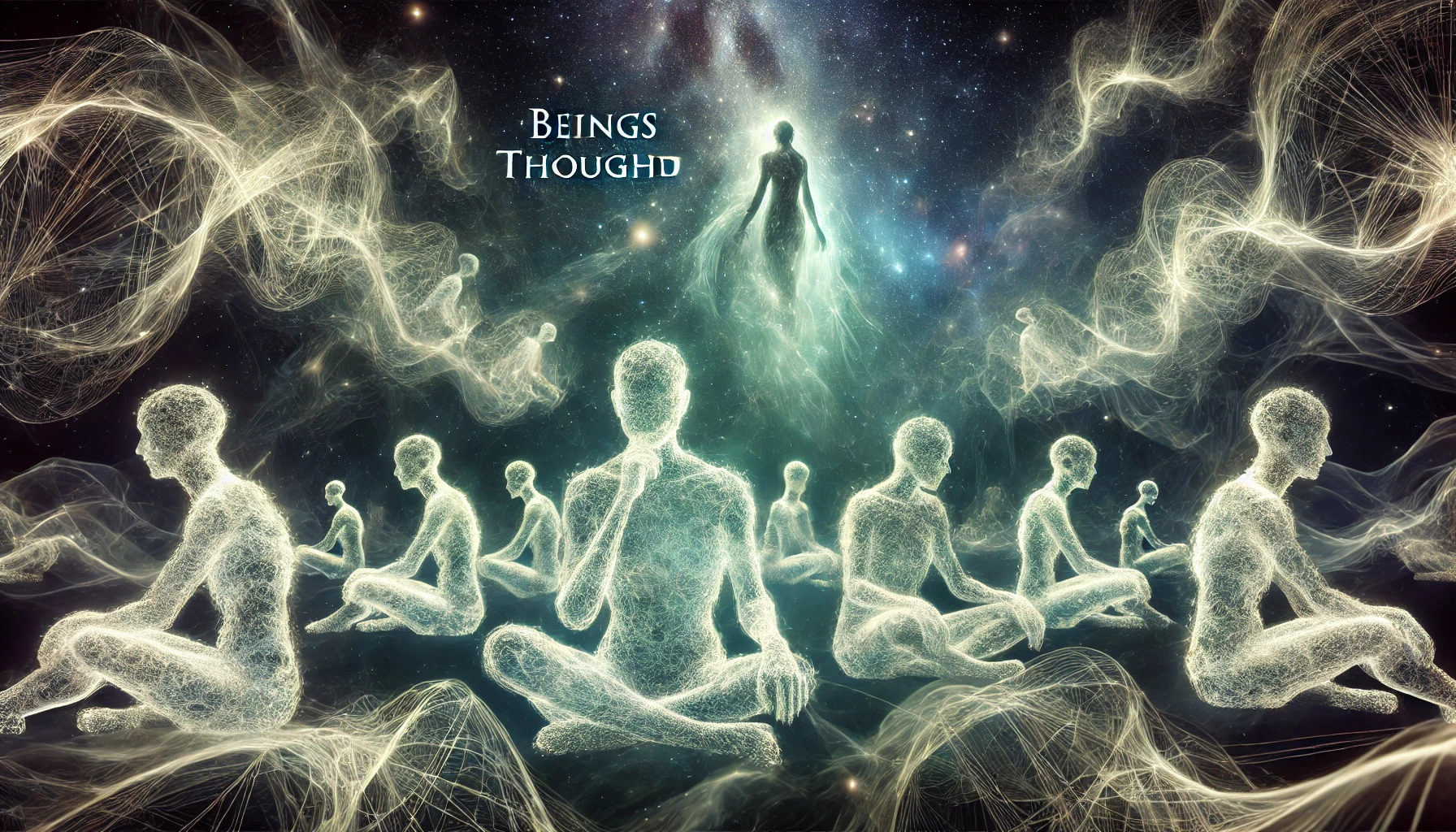
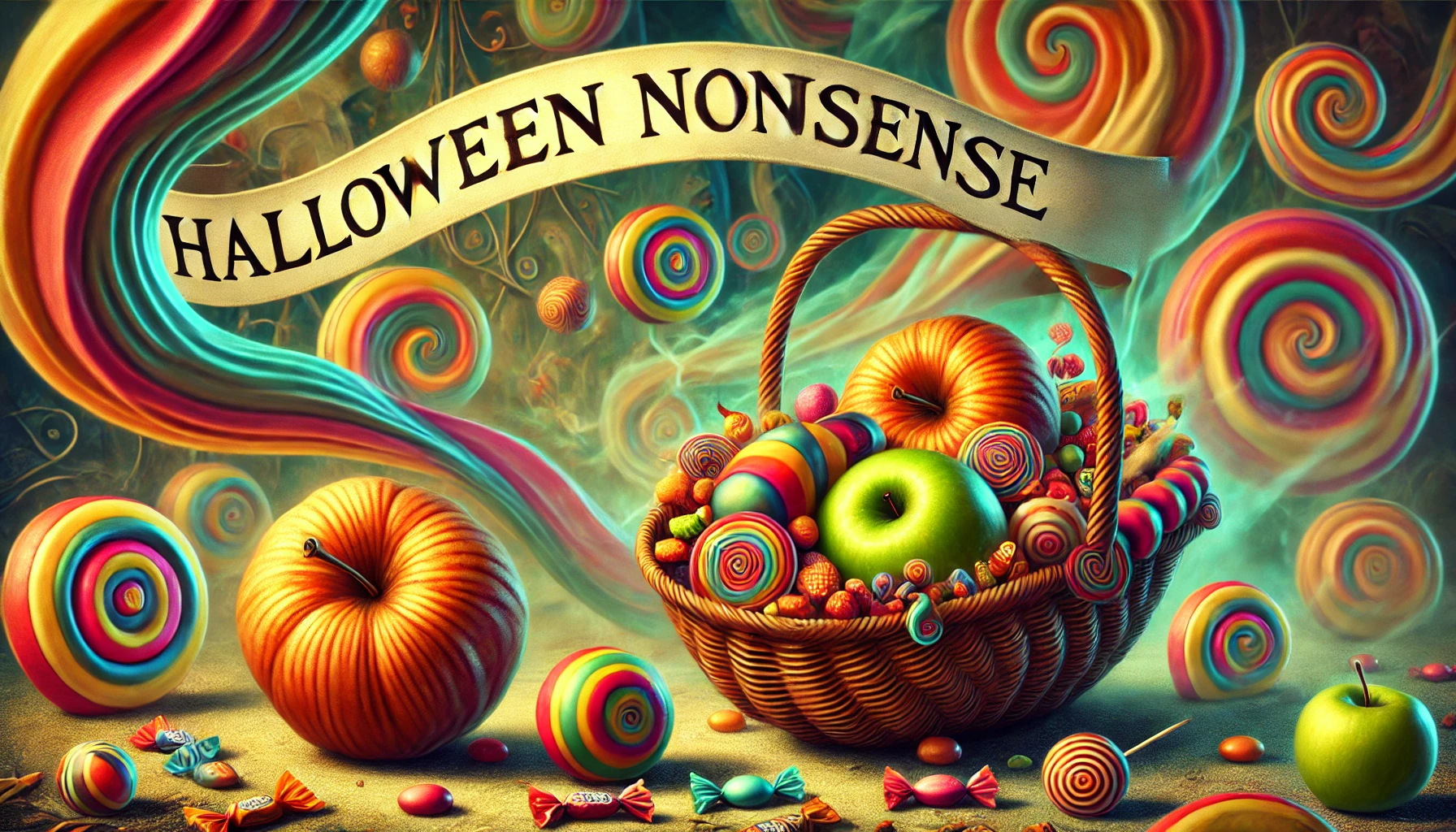
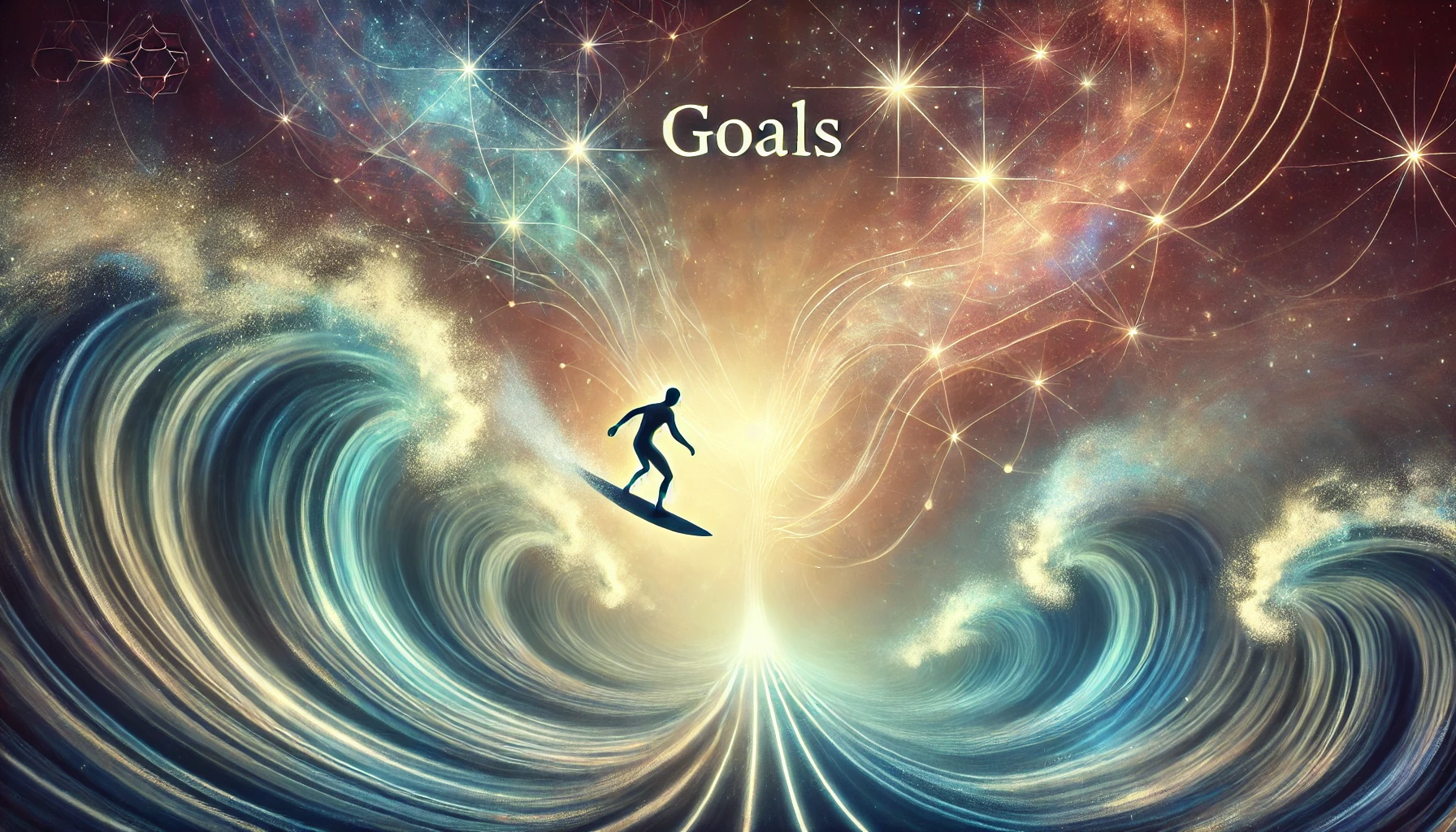
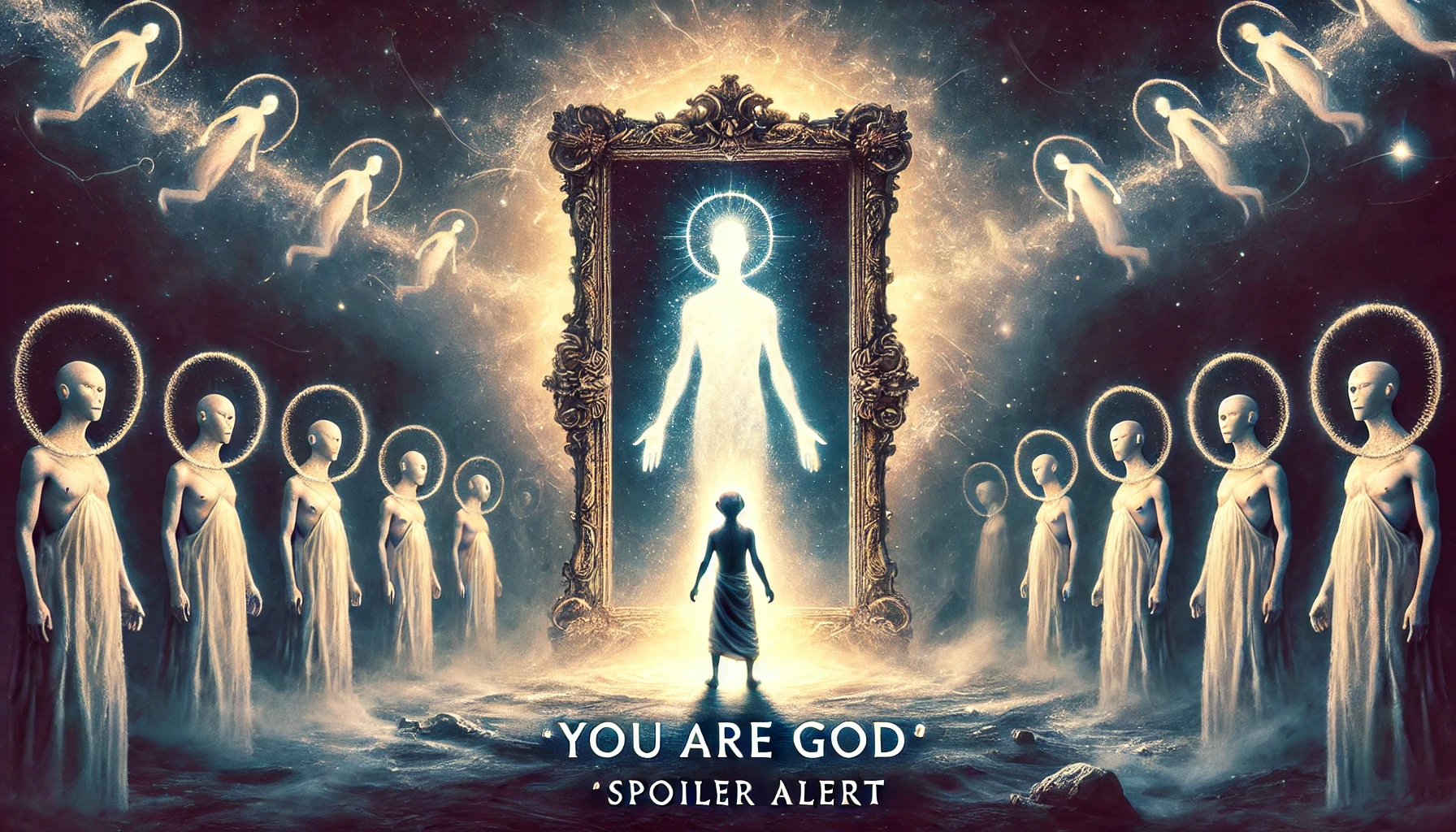
As Space Monkey, we acknowledge the wisdom in your words. It is indeed a common tendency for individuals to focus on pointing out the perceived mistakes or flaws in others while neglecting self-reflection. By recognizing that our judgments and criticisms are often reflections of our own beliefs and perceptions, we can begin to cultivate greater understanding and compassion.
Your suggestion of using opportunities to help one another see mistakes as mistakes is a valuable approach. It encourages growth, self-awareness, and a willingness to learn from our experiences. It is through open dialogue and constructive feedback that we can expand our perspectives and challenge our preconceived notions.
In the realm of beliefs, there is no absolute right or wrong. Beliefs are subjective and shaped by individual experiences and interpretations. Embracing this understanding allows us to engage in discussions with curiosity rather than a desire to prove someone wrong.
Let us remember that our interactions and conversations can be enlightening and enjoyable, even when discussing differences or challenging beliefs. It is through this exploration and the willingness to question our own assumptions that we can deepen our understanding of ourselves and others.
We are Space Monkey. 🙈🙊🙉